This brings us to 261 days, so that the total time of the Flood was 371 days, extending over a year. That also conforms to the statement of Scripture that the Flood was universal.
Genesis 8:13-19 KJV
[13] And it came to pass in the six hundredth and first year, in the first month, the first day of the month, the waters were dried up from off the earth: and Noah removed the covering of the ark, and looked, and, behold, the face of the ground was dry.
[14] And in the second month, on the seven and twentieth day of the month, was the earth dried.
[15] And God spake unto Noah, saying,
[16] Go forth of the ark, thou, and thy wife, and thy sons, and thy sons’ wives with thee.
[17] Bring forth with thee every living thing that is with thee, of all flesh, both of fowl, and of cattle, and of every creeping thing that creepeth upon the earth; that they may breed abundantly in the earth, and be fruitful, and multiply upon the earth.
[18] And Noah went forth, and his sons, and his wife, and his sons’ wives with him:
[19] Every beast, every creeping thing, and every fowl, and whatsoever creepeth upon the earth, after their kinds, went forth out of the ark.
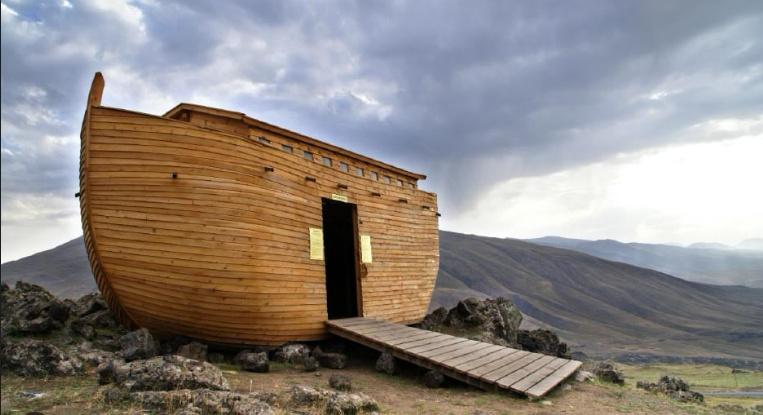
Genesis 8:13
And it came to pass in the six hundredth and first year, in the first month, the first day of the month, the waters were dried up from off the earth: and Noah removed the covering of the ark, and looked, and, behold, the face of the ground was dry.
And it came to pass, in the six hundred and first year,….
Of Noah’s life, and so the Septuagint adds, in the first month: the first day of the month. It was the first day of the year, New Year’s Day, and a joyful one it was to Noah and his family, when they saw dry ground.
Which they had not seen for above ten months. The waters were dried up from off the earth: by the wind that continued to pass over it, and by the sun, which exhaled great quantities of it throughout the whole summer season.
It was from the end of the one hundred days, when the wind was first made, and the waters began to assuage to this time.
As well as also by their soaking into the earth, and by returning to the cavities and receptacles in it: and Noah removed the covering of the ark, and looked. Not the roof of it, at least not the whole, only a board or two.
Though perhaps this was a covering made of skins, that was thrown over the ark, like that which was put over the tabernacle of Moses, and was made of skins, found in Exodus 26:14 where the same word is used as here.
The use of this might be to hang over the window and defend it from the rain. The uncovering of the ark was only putting by, or turning up this covering, that he might be able more clearly to see, out of the window, how things were.
And, behold, the face of the ground was dry; the ground or surface of the earth looked dry.
But was not so dry and hard as to bear heavy bodies, or the foot to tread on it, being soft and tender, through the water so long upon it, and had left mud and slime, not yet sufficiently hardened by the wind and sun to walk upon.
This brings us to 261 days, so that the total time of the Flood was 371 days, extending over a year. That also conforms to the statement of Scripture that the Flood was universal; it was not just the filling of a swimming pool—it certainly was more than that!
There have been other discoveries that have revealed something concerning the Flood.
I would like to pass on to you the words of Dr. J. E. Shelley who takes the position that the Flood was universal, that it covered the entire earth:
“The most striking example of this is found in the case of the mammoths. These elephants are found buried in the frozen silt of the Tundra, Siberia, all over the length of the Continent of Asia, and in the North of Alaska and Canada.
They are found in herds on the higher ground not bogged in marshes, hundreds of thousands in number.” He goes on to say that these elephants have been examined and found to have drowned.
If they had just gotten bogged down, they would have died of starvation.
“The farther north one goes, the more there are, till the soil of the islands of the White Sea inside the Arctic circle consists largely of their bones mingled with those of sabre-tooth tiger, giant elk, cave bear, musk ox, and with trunks of trees and trees rooted in the soil.
There are now no trees in those regions, the nearest being hundreds almost thousands of miles away.
The mammoth could not eat the stunted vegetation which now grows in this region for but three months in the year, a hundred square miles of which would not keep one of them alive for a month.
The food in their stomachs is pine, hawthorn branches, etc. These mammoths were buried alive in the silt when that silt was soft. They and the silt were then suddenly frozen and have never been unfrozen.
For they show no signs of decomposition. Mammoth ivory has been sold on the London docks for more than a thousand years.
The Natural History Museum purchased a mammoth’s head and tusks from the ivory store of the London Docks. This head was absolutely fresh and was covered with its original fur.”
If you doubt the universality of the Flood, here is more than enough evidence to convince you.
This is the fourth specific date we’re given in the timeline of the events surrounding the flood and its aftermath. The first was the day the rains came. The second was the day the ark landed in the mountains of Ararat.
The third was day the tops of the mountains became visible above the waves. One reason for giving such specific dates is to emphasize the historical nature of the text.
The story of the flood is not characterized as “once upon a time,” but as an actual event in the real world.
This date, the 601st year of Noah’s life, on the first day of the first month, is the day Noah saw with his own eyes that the ground was finally dry. First, Noah removed the covering from the ark.
We’re not sure exactly what this means. It could indicate that Noah realized the rains were truly done and a covering was needed no longer. In any case, the act of removing the covering gave him a clear view of the world around the ark.
He saw dry ground. The land was ready to support him, his family, and every kind of animal, insect, and bird on the boat. Or, at least it appeared to be dry.
But, apparently it wasn’t quite ready. The next verse will reveal that they did not disembark for another two months, until God gave them explicit approval to do so.
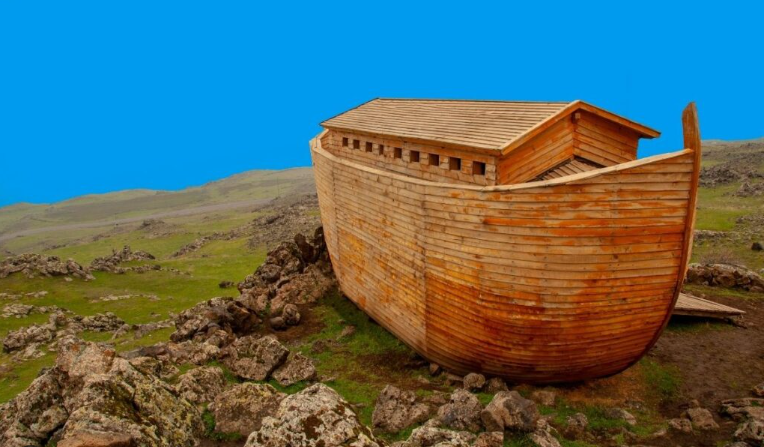
Genesis 8:14
And in the second month, on the seven and twentieth day of the month, was the earth dried.
Probably only as much of it as would afford him a prospect of the earth around. Yet for about two months he never stirred from his appointed abode till he had received the express permission of God.
We should watch the leading of Providence to direct us in every step of the journey of life.
The previous verse marked the day when Noah removed a covering from the ark and saw that the ground was dry. At least “the face of the ground” seemed to be ready for life. Looks can be deceiving, however.
We don’t know exactly why Noah waited so long to release the occupants of the ark. Perhaps the ground was dry but not yet dry enough to support all of them.
Perhaps Noah was waiting for God to give the word that it was okay to disembark (Genesis 8:15). This verse marks a day nearly two months later, where we are again told that the earth was dried out.
Noah was sealed into the ark on the seventh day of the second month of his 600th year. He leaves it on the twenty-seventh day of the second month of his 601st year.
Using the 360-day Old Testament calendar, this is one year and ten days. Adding up the days in this account, we have 150 days of flooding, 150 days of receding waters, and seventy days of waiting for the earth to dry.
God will make it clear, in the next verse, that the time has finally come for the last of earth’s humans and all of the ark’s animals to leave the ark and begin to repopulate earth once again.
Genesis 8:15
And God spake unto Noah, saying,
Whether in a dream or vision, or by an articulate voice, appearing in an human form, or by an impulse on his mind, is not certain; however, the Lord spoke so to him, that he heard him and understood him: it was, no doubt, very rejoicing to him, since he had not heard his voice for a year or more, at least that we read of; and what he said to him was as follows.
The previous two verses showed a gap of nearly two months between when Noah saw that the earth was dry and this day. The fact that Noah waited for God’s direct instruction before leaving the ark is no coincidence.
Earlier, Scripture indicated that Noah was faithful and obedient to God (Genesis 6:8, 22; 7:5). Noah’s survival to this point required him to trust God’s commands in building the ark.
Before taking the last living members of the human race out into a radically-changed world, Noah will remain patient and allow God to control his timing.
Rather than rushing out at the first sign of muddy earth, Noah waits for God to give the word that they could leave the ark. This is that moment.
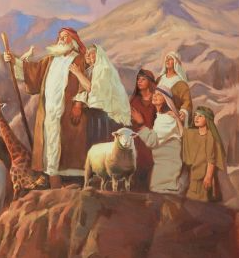
Genesis 8:16
Go forth of the ark, thou, and thy wife, and thy sons, and thy sons’ wives with thee.
They went forth in the most orderly manner – the human occupants first, then each species, after their kinds, found in Genesis 8:19, literally, according to their families, implying that there had been an increase in the ark.
The Jewish writers observe, that the manner of Noah and his family coming out of the ark is different from that of their going into it.
When they went into it, then went the men by themselves, and the women by themselves, and so continued apart in the ark, the use of the marriage bed being forbidden them, being a time of distress.
But now when they came out they are coupled together, signifying that they were now free to cohabit together.
It is finally time to leave the ark!
This is the moment Noah and his family have likely been eagerly anticipating for quite some time.
After all of the work preparing the ark, the catastrophic deaths of all other people, and an entire year sealed inside a floating box, this is a moment of incredible triumph.
Without the ark, they would all have died along with the rest of humanity. But the purpose of the ark was simply to preserve Noah, his family (Genesis 7:13), and the animals for this moment. Now, God intends them to begin humanity over again.
The fact that Scripture specifically refers to Noah, and his wife, and his sons, and his sons’ wives is no accident. This emphasizes the fact that God has had them in his sight, and that He recognizes their desire to walk freely on the earth once again (Genesis 8:18).

Genesis 8:17
Bring forth with thee every living thing that is with thee, of all flesh, both of fowl, and of cattle, and of every creeping thing that creepeth upon the earth; that they may breed abundantly in the earth, and be fruitful, and multiply upon the earth.
Bring forth with thee every living thing that is with thee,….
There is a various reading of the word for “bring forth”; according to the margin, the sense is, order them to come forth; and according to the Scripture, if they will not, oblige them to come: of all flesh, both of fowl, and of cattle, and of every creeping thing that creepeth upon the earth.
For of each of these there were some that went with him into the ark, and continued there: that they may breed abundantly in the earth, and be fruitful, and multiply upon the earth,
for which end they were preserved in the ark.
It is said, on the earth, not in the ark, which shows that birds and beasts were likely not allowed to couple, and that they did not breed there.
It is a question with some, how the creatures, which were only in Asia at their coming out of the ark, could spread themselves all over the earth.
Particularly how they could get into islands, and especially into America.
To which it may be answered, that this might be done by many of them, by swimming over narrow seas, for some wild creatures will swim whole days and nights together, when they are forced to it; and by men’s carrying others in vessels to distant and different parts, on one account or another, either for profit or pleasure.
And especially, what is it the power and providence of God cannot do, who could not be at a loss for ways and means to replenish a world in all the parts of it He had made desolate, when it was His pleasure?
Most creationists think the earth entered an ice age after the flood. This would make the sea level lower than it is today.
If the average sea level was lowered by only six hundred feet, all the major continents would be connected by land bridges.
Animals could easily migrate to any continent.
God’s command from the prior verse was not merely for Noah and his family to make a temporary excursion. The specific reference to all the human beings on board highlights the fact that all of them are to leave the vessel.
Here, God continues His command to Noah to empty the ark. Once again, God is clear: Every single living thing needs to leave the ark, head out into the world remade by the flood, and begin to “swarm” and reproduce.
The ark has served its purpose, and the living things God has saved through it now need to fulfill theirs. At this moment in history, the main task of humanity and animals and insects is the same: Multiply, expand, begin the process of filling the earth up again.
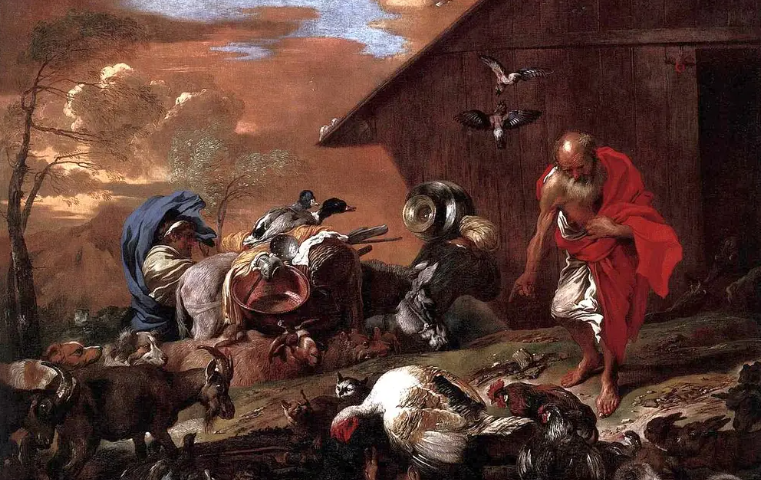
Genesis 8:18
And Noah went forth, and his sons, and his wife, and his sons’ wives with him:
And Noah went forth,….
Being obedient to the divine command, and no doubt with great pleasure in his countenance, and with a heart full of thankfulness for so great a deliverance: and his sons, and his wife, and his sons’ wives with him.
In all eight persons, and no more were saved in the ark, as Peter observes, 1 Peter 3:20 and the Arabic writers say, Noah and his sons built a city near the place where they came out of the ark, and called it Themanin, giving this as a reason of the name, we are eight, that is, who have escaped.
The earth being dried of the waters, there were then only eight people in Armenia, from whence all mankind sprung.
Once God gave the word that it was time to leave the ark, Noah and the other human occupants left together. This is yet another example of Noah’s obedience to God.
Prior Scriptures showed Noah responding to the will of God with total compliance (Genesis 6:22; 7:5). While it’s likely the people on board were eager to walk on open ground again, it’s also possible that fear might have been a problem.
After the catastrophe of the flood, one would hardly blame those on board the ark for being nervous about what the world was like. The command of God in the prior verse shows this was not His intent.
Fearful, or eager, the obedience of Noah and his family is exemplary. They would become the “new” first, the beginning again, of all the humans on earth.
Genesis 8:19
Every beast, every creeping thing, and every fowl, and whatsoever creepeth upon the earth, after their kinds, went forth out of the ark.
Every beast, every creeping thing, and every fowl, and whatsoever creepeth upon the earth,….
All went out, not one was left, and they went out, after their kind. Not in a confused disorderly manner, mixing with one another; but as they went in by pairs, male and female of every sort, so they came forth in like manner, or, according to their families.
By which it seems as if the creatures did breed in the ark, and had their families of young ones, went forth out of the ark, everyone with his mate, in order to procreate and multiply upon the earth.
Finally, after a full year aboard the ark, all the animals—wild animals, creeping things, birds, everything that moves—left the ark together in an orderly fashion.
Note that, while the animals were specifically said to have entered in pairs (Genesis 6:19–20; 7:8–9), this verse simply says that the animals went out “by families.”
No mention is made of pairs here, and “families” were not mentioned when the ark was being filled. While the text itself does not say so explicitly, it is all but certain that many of the pairs of animals reproduced during the voyage.
These creatures are now setting foot on the remade earth as a larger family groupings.
Also clear in this verse is the supernatural influence of God. Animals simply don’t co-exist in an orderly fashion like this. Noah was not an expert in taming wild beasts.
The only way these animals could have entered, survived together, and exited the ark was through the direct intervention of God for the sake of saving each kind of animal that was saved.
I hope that you have really enjoyed this post,
Please Leave All Comments in the Comment Box Below ↓

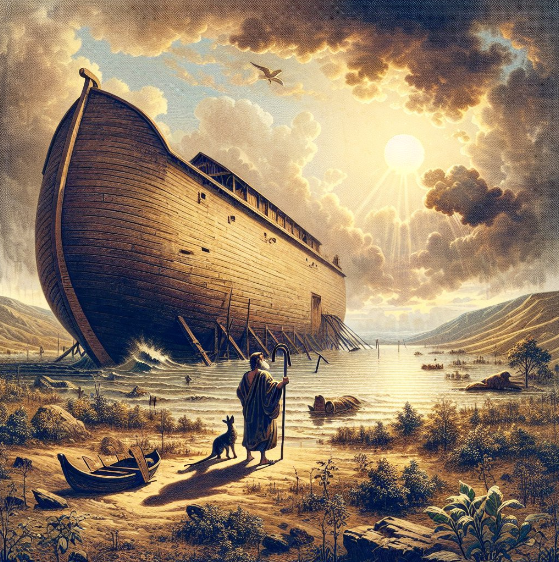











Hi there!
I just read your article about the total time of the Flood and how it lasted for 371 days, which confirms that the Flood was universal, not just the filling of a swimming pool.
I found your explanation of Genesis 8:13-19 KJV to be very detailed and informative. Your analysis of the use of covering over the ark and how Noah removed it to see the dry ground was fascinating.
I also appreciate you sharing Dr. J.E. Shelley’s findings about the mammoths, which further supports the notion that the Flood was indeed a global event.
Your information is well-written, and I enjoyed reading it.
Keep up the good work!
Hello Anoth,
Thank you for your time, stopping by commenting, and supporting HBS & DwJ the way you do.
Your insight into the explanation of Genesis 8:13-19 KJV being very detailed and informative is greatly appreciated, as well as your appreciation on the sharing of Dr. J.E. Shelley’s findings about the mammoths.
Thanks again,
Blessings My Friend!
Hi Jerry,
Even today, weather disturbances, including flooding, are caused directly by El Nino and La Nina changes.
These are the rising and cooling temperatures of the sea’s surface waters. I appreciate your article and I hope you get to connect with like-minded people. The Noah movie, based on this story, with Steve Carell, was highly enjoyable.
Hello Serena,
Thank you for your time, stopping by commenting, and supporting HBS & DwJ the way you do.
Your insight into the weather patterns are greatly appreciated.
I imagine many people enjoyed the Evan Almighty movie as much as you.
Thanks again,
Blessings My Friend!
The survival of both man and animal in the ark is another miracle.
God showed His supremacy by keeping all of them for 371 days. As you rightly identified, reproduction must have taken place in the ark.
God is a God of order. He does things in order. He must have planned the continual existence of man before the ark. And we, His children must emulate His planning to succeed in our endeavours.
Hello Parameter,
Thank you for taking the time to comment on another HBS & DwJ Podcast episode.
I agree that the survival of both man and animal in the ark is another miracle, because Noah labored faithfully to build the Ark at God’s command, ultimately saving not only his own family, but mankind itself, as well as, all land animals, from extinction during the Flood.
God’s supremacy is also demonstrated in His perfect rule over the wills of men. Thanks again for your time.
Please Have A Blessed Day!
As someone who is new to the topic of biblical accounts and religious texts, I found the article interesting, particularly the focus on the story of Noah and the Flood.
I’m intrigued by the description of the Flood and how it is presented as a historical event with specific dates and details.
However, one thing I’m curious about is the mention of mammoths and other creatures found buried in the frozen silt of the Tundra, Siberia, and other regions.
How do these discoveries relate to the story of Noah and the Ark?
Are there different interpretations or theories about how these ancient animals could have been preserved and buried in such a way?
Additionally, the article mentions that most creationists think the earth entered an ice age after the flood, leading to lower sea levels and land bridges connecting continents.
I wonder how the concept of an ice age fits into the story of the Flood, and if there are varying views on how these geological changes occurred in relation to the biblical account?
Hello skamalka,
Thanks for continuing to return to, read, and comment on the HBS & DwJ website turned Podcast episode platform.
There is strong evidence that, following the Flood, for a time ice and snow covered much of Canada and northern USA, northwestern Eurasia, Greenland and Antarctica. Evolutionists believe there were many ice ages, but it’s more likely they were advance/retreat cycles within a single Ice Age.
An evolutionist suggests that mammoths “died suddenly by drowning or asphyxiation following burial in mud flows, caved-in river banks, or collapsed gully walls”. Oard suggests flooding caused by ice melting at the close of the Ice Age could have caused such local catastrophes, and a quick drop in temperature (but not a snap-freeze) explains the freezing.
The location of the mammoths makes it unlikely they were formed during Noah’s Flood. They are always found in frozen ‘muck’ in Alaska and ‘yedomas’ in Siberia, near the surface throughout the mid and high latitudes, mostly in river valleys, and occasionally in ice wedges. Despite the myths, most mammoths are Not encased in ice.
Your continued participation is greatly appreciated,
Blessings My Friend!
Wow, the detailed account of Noah leaving the ark is truly remarkable.
The precision of the dates and the obedience of Noah and his family to God’s commands is inspiring. It’s incredible to think about the new beginning they faced after the flood and how they were entrusted with repopulating the Earth.
The way all the creatures left the ark in an orderly manner, according to their kinds, highlights the divine order and purpose in creation.
The Flood’s universality is evident in these events, and it’s fascinating to consider how the world changed after such a cataclysmic event.
Hello Jason,
Welcome again to the HBS & DwJ website.
Thank you again for commenting on another Holy Bible Study session, turned HBS & DwJ Podcast episode. Thank you for your appreciation of this topic. I am so thankful that it peaks your interest at all.
Talk to you soon.
Many Blessings To You My Friend!